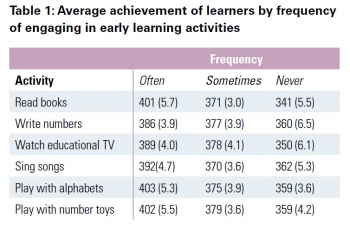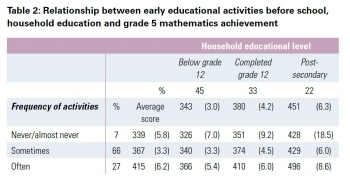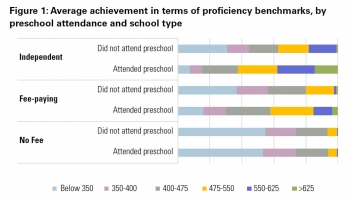The importance of the early learning environment
South Africa is a very diverse country. Among our school learners, home and school resources are vastly unequal and very low compared to international standards. What parents have is indeed important, but the findings of the 2015 Trends in International Mathematics and Science Study (TIMSS) show what caregivers do during a child’s early years is just as important, writes Dr Kathryn Isdale.
Learning starts long before children walk into the classroom on the first day of grade 1. It is a cumulative process that begins with understanding many basic cognitive, linguistic, perceptual and motor processes that provide the building blocks for subsequent skill development.
Socio-economic status indicators, such as parents’ level of education and the number of books in the home, are positively related to learner achievement. Those with more often perform better and learners from households with the lowest levels of resources do worse academically.
Compounding this disadvantage, the poorer learners are more likely to attend impoverished no-fee schools and less likely to have the language of instruction as their home language.
Early educational activities
As part of the grade 5 TIMSS, parents were asked about the different types of early educational activities that were commonplace in their homes before children started grade 1, including reading books, singing songs, and playing with number toys and word games. Learners whose parents reported frequent engagement across a range of 17 such activities had significantly higher scores in grade 5 mathematics (Table 1).
Table 1: Average achievement of learners by frequency of engaging in early learning activities
While socio-economic resources in the home and the early educational environments therein are correlated, each has their own unique relationship with academic outcomes. Table 2 summarises the combined influence of socio-economic factors and the level of cognitive stimulation promoted in the home. As each contextual indicator increases, so does learner performance in mathematics.
On average, learners in households where there is frequent use of literacy and numeracy activities before school and where at least one parent has a post-school qualification (22% of learners), scored 170 points higher than those from households where early educational activities are a rarity and parental education is below grade 12 (45% of learners): 496 points vs. 326 points. This 170 points difference is equivalent to a difference of around four school grades.
Preschool attendance
Preschool attendance in South Africa has increased considerably over recent years with almost nine out of ten learners having some form of schooling prior to grade 1, compared to just 20% of the population participating in early childhood development programmes in 1996. This is particularly encouraging as the TIMSS data show a positive, incremental relationship between years of attending preschool and mathematics achievement in grade 5. Learners who did not attend preschools, scored an average of 353 points, compared to the 362 points scored by those who attended for one year, 384 points for those with two years’ attendance and 390 points for the 48% of learners with a minimum of three years’ preschool experience.
These are average scores, however, and on closer examination of the data we see that the benefits of early participation are not universal. Learners who attended preschool but went on to public no-fee schools did not appear to gain the same advantage from attending early education settings as their counterparts in fee-paying and independent schools. Figure 1 shows similar proportions across each of the proficiency benchmarks for learners in no-fee schools, regardless of preschool attendance, while for those in fee-paying and independent schools, learners who attended preschool have a much higher achievement profile than learners who did not.
This may reflect that learners who go on to no-fee schools receive a lower quality of education, or that poorly resourced no-fee schools cannot sustain and build on the pre-schoolers’ early learning gains. Regardless, it is wasteful not to capitalise all potential gains associated with high quality early years provision, particularly if it could benefit those at the bottom end of the ladder.
Conclusion
Our findings also show that what parents do matters alongside what they have. Cognitively stimulating environments where caregivers engage frequently in early educational activities are associated with higher performance in grade 5. The activities and experiences a child is exposed to at home and in preschool settings, play an essential role in early development through influencing the language they hear, the interactions they have with others, and skills and abilities that are promoted.
This research shows that the disparities that exist in educational outcomes often begin long before learners start their formal schooling, reflecting a lack of early educational engagement and quality early years’ experience.
Without intervention, these early inequalities continue to widen through school, into adulthood and across generations. Understanding the role that home and preschool environments play in developing these foundations is vital to improving performance. Parents are more than the resources they have. Just having a “place to go” in terms of early childcare is not enough. To help learners start school with the best possible chances, children need solid exposure to a range of rich educational activities and environments that are cognitively stimulating.
Author: Dr Kathryn Isdale, HRSC honorary research fellow
kate.isdale@gmail.com



